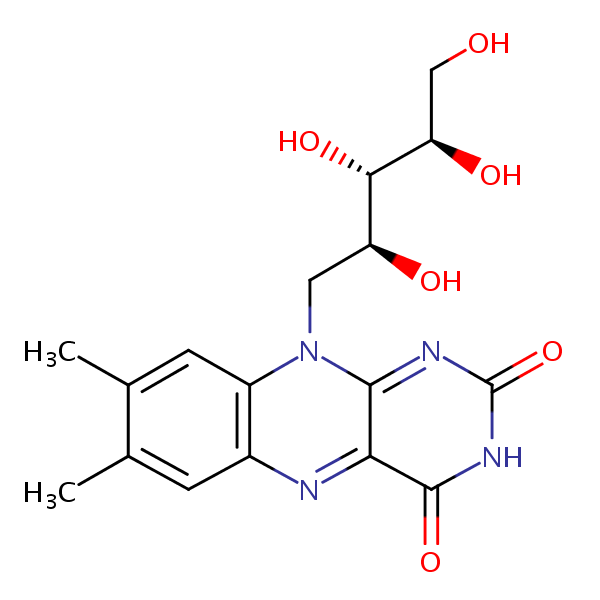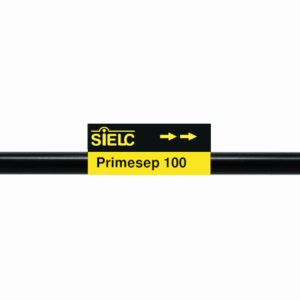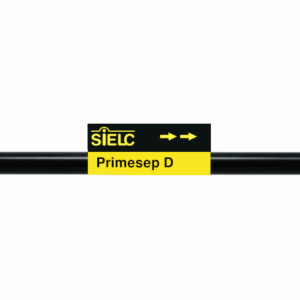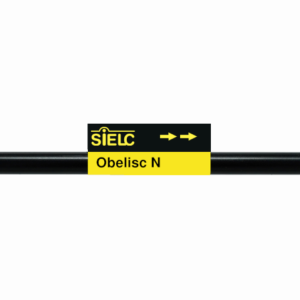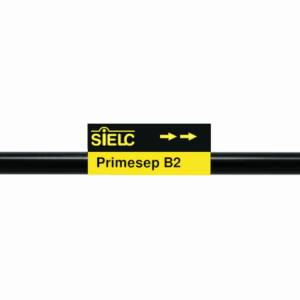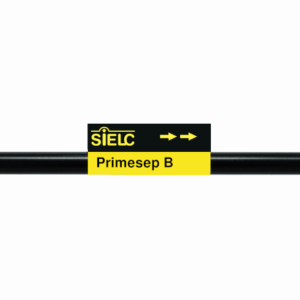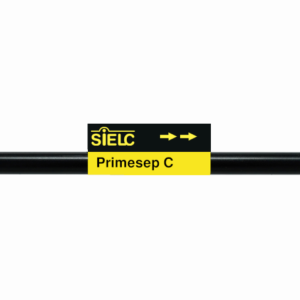| CAS Number | 83-88-5 |
|---|---|
| Molecular Formula | C17H20N4O6 |
| Molecular Weight | 376.369 |
| InChI Key | AUNGANRZJHBGPY-SCRDCRAPSA-N |
| LogP | -1.46 |
| Synonyms |
|
Applications:
UV-Vis Spectrum of Riboflavin (Vitamin B2)
September 16, 2024
For optimal results in HPLC analysis, it is recommended to measure absorbance at a wavelength that matches the absorption maximum of the compound(s) being analyzed. The UV spectrum shown can assist in selecting an appropriate wavelength for your analysis. Please note that certain mobile phases and buffers may block wavelengths below 230 nm, rendering absorbance measurement at these wavelengths ineffective. If detection below 230 nm is required, it is recommended to use acetonitrile and water as low UV-transparent mobile phases, with phosphoric acid and its salts, sulfuric acid, and TFA as buffers.
For some compounds, the UV-Vis Spectrum is affected by the pH of the mobile phase. The spectra presented here are measured with an acidic mobile phase that has a pH of 3 or lower.

HPLC Method for Analysis of Water-Soluble Vitamins (B1, B2, B3, B6) on Primesep 100 Column
August 28, 2024
High Performance Liquid Chromatography (HPLC) Method for Analysis of Water-Soluble Vitamins (B1, B2, B3, B6) on Primesep 100 by SIELC Technologies
Separation type: Liquid Chromatography Mixed-mode SIELC Technologies
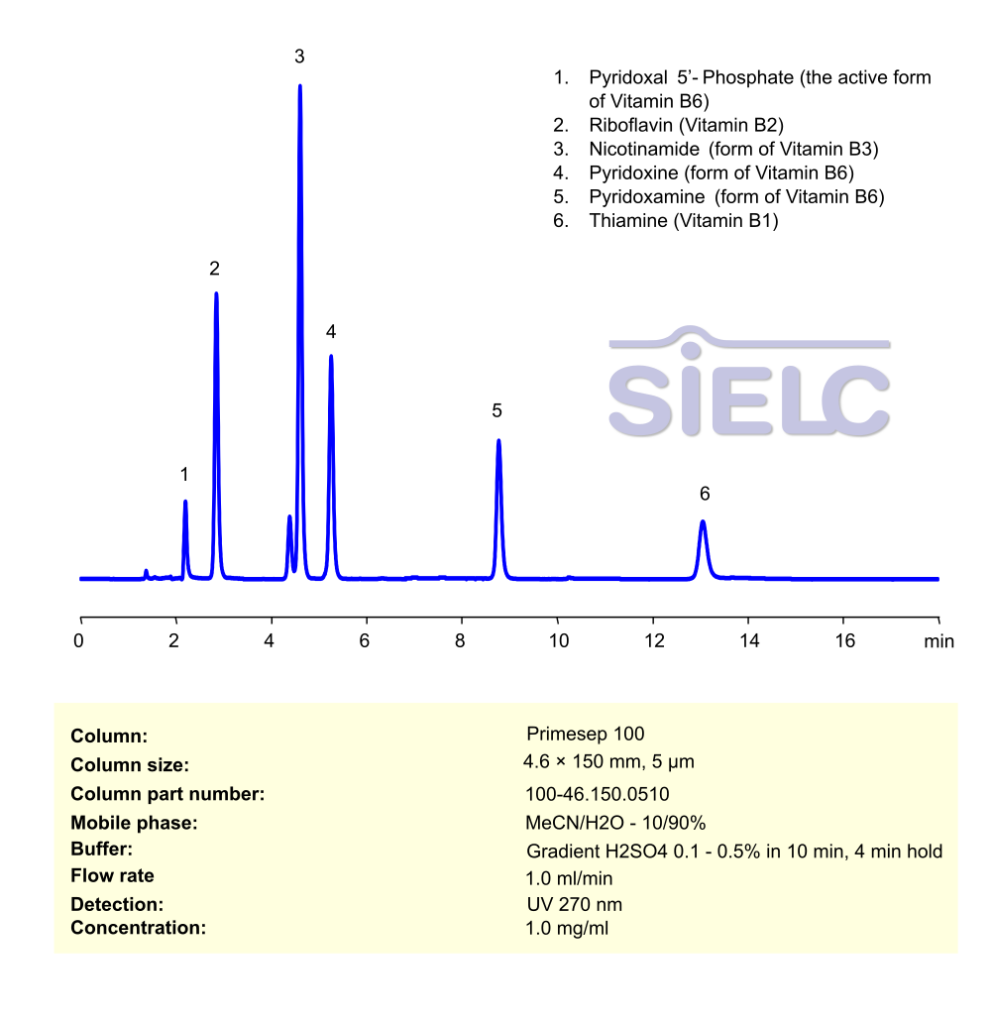
High Performance Liquid Chromatography (HPLC) Method for Analysis of Vitamin B1 (Thiamine), Vitamin B2 (Riboflavin), Nicotinamide, Vitamin B6 (Pyridoxine), Pyridoxamine, Pyridoxal Phosphate
Water-Soluble Vitamins (B1, B2, B3, B6) can be retained, separated and analyzed using a Primesep 100 mixed-mode stationary phase column. The analysis employs an gradient method with a simple mobile phase comprising water, acetonitrile (MeCN), and sulfuric acid as a buffer. This method allows for detection using UV 300 nm.
You can find detailed UV spectra of Vitamin B1 (Thiamine), Vitamin B2 (Riboflavin), Nicotinamide, Vitamin B6 (Pyridoxine), Pyridoxamine, Pyridoxal Phosphate and information about its various lambda maxima by visiting the following links: Vitamins (B1, B2, B3, B6)
| Column | Primesep 100, 4.6 x 150 mm, 5 µm, 100 A |
| Mobile Phase | MeCN – 10% |
| Buffer | Gradient H2SO4 -0.1-0.5% in 10 min |
| Flow Rate | 1.0 ml/min |
| Detection | UV 270 nm |
| Class of Compounds | Water-Soluble Vitamins (B1, B2, B3, B6) |
| Analyzing Compounds | Vitamin B1 (Thiamine), Vitamin B2 (Riboflavin), Nicotinamide, Vitamin B6 (Pyridoxine), Pyridoxamine, Pyridoxal Phosphate |
Application Column
Primesep 100
Column Diameter: 4.6 mm
Column Length: 150 mm
Particle Size: 5 µm
Pore Size: 100 A
Pyridoxal Phosphate
Pyridoxamine
Vitamin B1 (Thiamine)
Vitamin B2 (Riboflavin)
Vitamin B6 (Pyridoxine)

Separation of Vitamins in Mixed-Mode HPLC
August 22, 2010
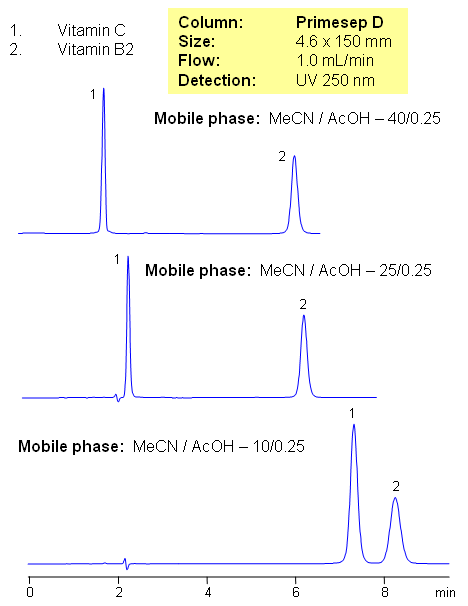
Separation of Vitamin B2 and Vitamin C is demonstrated on a Primesep D mixed-mode column. This column can be used for analysis of other hydrophobic or neutral vitamins and supplements.
| Column | Primesep D , 4.6×150 mm, 5 µm, 100A |
| Mobile Phase | MeCN/H2O |
| Buffer | Acetic Acid |
| Flow Rate | 1.0 ml/min |
| Detection | UV, 250 nm |
| Class of Compounds |
Drug, Vitamin B₆, Hydrophobic, Ionizable |
| Analyzing Compounds | Vitamins C (ascorbic acid) and B2 (riboflavin) |
Application Column
Primesep D
The Primesep family of mixed-mode columns offers a wide variety of stationary phases, boasting unprecedented selectivity in the separation of a broad array of chemical compounds across multiple applications. Corresponding Primesep guard columns, available with all stationary phases, do not require holders. SIELC provides a method development service available to all customers. Inquire about our specially-tailored custom LC-phases for specific separations.
Select optionsVitamin C

HPLC Separation of Vitamin C, Vitamin Group B, and Related Impurities
August 22, 2008
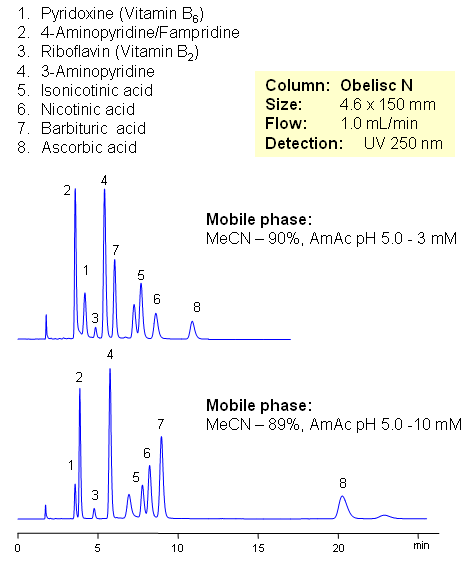
Vitamin C (ascorbic acid) and Vitamins Group B are separated on Obelisc N mixed-mode column. Method can be used in quantitation and determination of polar vitamins in various formulations and dietary supplements. HPLC method can be based on UV, Evaporative Light Scattering Detection (ESLD), RI or MS detection. Effect of sample matrix can be eliminated by changing mobile phase conditions. Buffer concentration, buffer pH and amount of ACN will affect every vitamin differently due to difference in polar and ionic properties.
| Column | Obelisc N , 4.6×150 mm, 5 µm, 100A |
| Mobile Phase | MeCN/H2O |
| Buffer | AmAc pH 5.0 |
| Flow Rate | 1.0 ml/min |
| Detection | UV, 250 nm |
| Class of Compounds |
Drug, Vitamin B₆, Hydrophobic, Ionizable |
| Analyzing Compounds | Pyridoxine, Ascorbic acid, Niacinamide, Pantothenic acid, Caffeine, Riboflavin, Barbituric Acid, 3- Aminopyrine |
Application Column
Obelisc N
SIELC has developed the Obelisc™ columns, which are mixed-mode and utilize Liquid Separation Cell technology (LiSC™). These cost-effective columns are the first of their kind to be commercially available and can replace multiple HPLC columns, including reversed-phase (RP), AQ-type reversed-phase, polar-embedded group RP columns, normal-phase, cation-exchange, anion-exchange, ion-exclusion, and HILIC (Hydrophilic Interaction Liquid Chromatography) columns. By controlling just three orthogonal method parameters - buffer concentration, buffer pH, and organic modifier concentration - users can adjust the column properties with pinpoint precision to separate complex mixtures.
Select options3-Aminopyridine
4-Aminopyridine/Fampridine
Ascorbic Acid
Barbituric Acid
Isonicotinic Acid
Nicotinic Acid/Niacin (3-pyridinecarboxylic acid)
Vitamin B2 (Riboflavin)
Vitamin B6 (Pyridoxine)

HPLC Method for Separation of Vitamins Group B such as Nicotinic Acid, Pyridoxine, Niacinamide, Pantothenic Acid, Riboflavin on Obelisc N Column
August 22, 2008
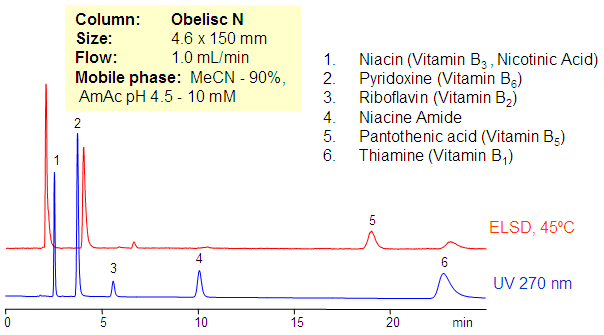
Separation of vitamins group B is achieved on Obelisc N column in HILIC mixed-mode. Vitamins of this group are different in polarity and ionic properties. Retention and separation is achieved by optimization of amount of ACN, buffer and buffer pH. Combination of UV and ELSD detection is used to monitor HPLC separation. B vitamins are water-soluble vitamins that play an important role in cell metabolism. Supplements containing all six are generally referred to as a vitamin B complex. Individual B vitamin supplements are referred to by the specific name of each vitamin. This method can be used to analyze individual B vitamins as well as vitamin B complex. Isolation of impurities as well as degradation products is possible by preparative chromatography.
| Column | Obelisc N , 4.6×150 mm, 5 µm, 100A |
| Mobile Phase | MeCN/H2O |
| Buffer | AmAC pH 4.5 – 10 mM |
| Flow Rate | 1.0 ml/min |
| Detection | UV, 270 nm, ELSD |
| Class of Compounds |
Drug, Vitamin B₆, Hydrophobic, Ionizable |
| Analyzing Compounds | Pyridoxine, Niacinamide, Pantothenic acid, Riboflavin |
Application Column
Obelisc N
SIELC has developed the Obelisc™ columns, which are mixed-mode and utilize Liquid Separation Cell technology (LiSC™). These cost-effective columns are the first of their kind to be commercially available and can replace multiple HPLC columns, including reversed-phase (RP), AQ-type reversed-phase, polar-embedded group RP columns, normal-phase, cation-exchange, anion-exchange, ion-exclusion, and HILIC (Hydrophilic Interaction Liquid Chromatography) columns. By controlling just three orthogonal method parameters - buffer concentration, buffer pH, and organic modifier concentration - users can adjust the column properties with pinpoint precision to separate complex mixtures.
Select optionsVitamin B1 (Thiamine)
Vitamin B2 (Riboflavin)
Vitamin B3 (Niacin)
Vitamin B5 (Pantothenic Acid)
Vitamin B6 (Pyridoxine)
UV Detection

HPLC Separation of Vitamin C and Vitamin B2
November 21, 2006
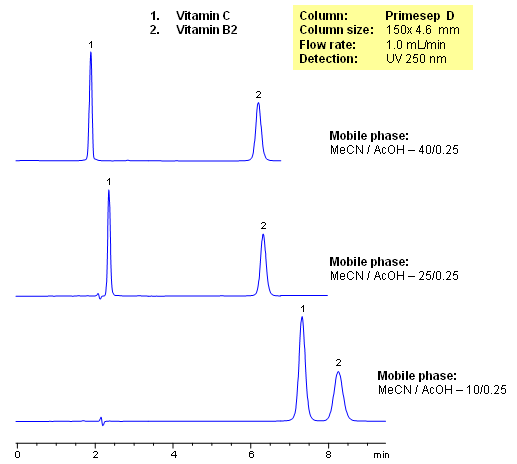
Vitamin C (ascorbic acid) and Vitamin B2 (riboflavin) are water-soluble vitamins that are not stored in the body and must be replaced each day. Primesep D easily resolves Vitamins C and B2 and the elution order can be reversed by adjusting acetonitrile and acetic acid concentrations in the mobile phase. The HPLC separation uses a mobile phase of water, acetonitrile (MeCN, ACN) and acetic acid (AcOH) and UV detection at 250 nm.
| Column | Primesep D , 4.6×150 mm, 5 µm, 100A |
| Mobile Phase | MeCN/H2O |
| Buffer | Acetic Acid |
| Flow Rate | 1.0 ml/min |
| Detection | UV, 250 nm |
| Class of Compounds |
Drug, Vitamin B₆, Hydrophobic, Ionizable |
| Analyzing Compounds | Vitamins C (ascorbic acid) and B2 (riboflavin) |
Application Column
Primesep D
The Primesep family of mixed-mode columns offers a wide variety of stationary phases, boasting unprecedented selectivity in the separation of a broad array of chemical compounds across multiple applications. Corresponding Primesep guard columns, available with all stationary phases, do not require holders. SIELC provides a method development service available to all customers. Inquire about our specially-tailored custom LC-phases for specific separations.
Select optionsVitamin C

HPLC Separation and Retention of Vitamins in Mixed-Mode on Primesep B2
May 5, 2005
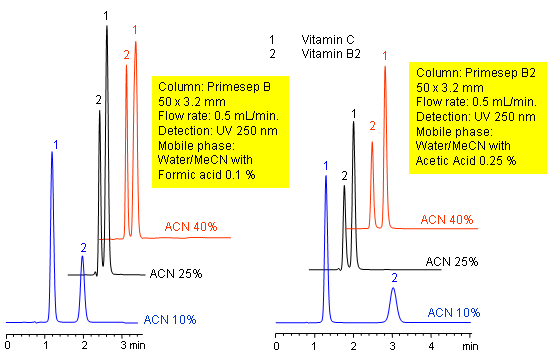
Primesep B and B2 columns separate Vitamins C (ascorbic acid) and B2 (riboflavin) with tunable selectivity. Both columns allow peak order reversal by simply changing the acetonitrile concentration in the mobile phase. Vitamin B2 is especially sensitive to acetonitrile concentration. The HPLC separation uses a mobile phase of water, acetonitrile (MeCN, ACN) and either trifluoroacetic acid (TFA) or acetic acid (HOAc) with UV detection at 250 nm.
| Column | Primesep B2, 3.2×50 mm, 5 µm, 100A |
| Mobile Phase | MeCN/H2O |
| Buffer | Formic Acid, Acetic Acid |
| Flow Rate | 0.5 ml/min |
| Detection | UV, 250 nm |
| Class of Compounds |
Drug, Vitamin B₆, Hydrophobic, Ionizable |
| Analyzing Compounds | Vitamins C (ascorbic acid) and B2 (riboflavin) |
Application Column
Primesep B2
Column Diameter: 3.2 mm
Column Length: 50 mm
Particle Size: 5 µm
Pore Size: 100 A
Vitamin C

HPLC Separation and Retention of Vitamins in Mixed-Mode on Primesep B
May 5, 2005

Primesep B and B2 columns separate Vitamins C (ascorbic acid) and B2 (riboflavin) with tunable selectivity. Both columns allow peak order reversal by simply changing the acetonitrile concentration in the mobile phase. Vitamin B2 is especially sensitive to acetonitrile concentration. The HPLC separation uses a mobile phase of water, acetonitrile (MeCN, ACN) and either trifluoroacetic acid (TFA) or acetic acid (HOAc) with UV detection at 250 nm.
| Column | Primesep B, 3.2×50 mm, 5 µm, 100A |
| Mobile Phase | MeCN/H2O |
| Buffer | Formic Acid, Acetic Acid |
| Flow Rate | 0.5 ml/min |
| Detection | UV, 250 nm |
| Class of Compounds |
Drug, Vitamin B₆, Hydrophobic, Ionizable |
| Analyzing Compounds | Vitamins C (ascorbic acid) and B2 (riboflavin) |
Application Column
Primesep B
Column Diameter: 3.2 mm
Column Length: 50 mm
Particle Size: 5 µm
Pore Size: 100 A
Vitamin C

HPLC Separation of Two Vitamins: Different Polarity – Isocratic Methods
May 13, 2004
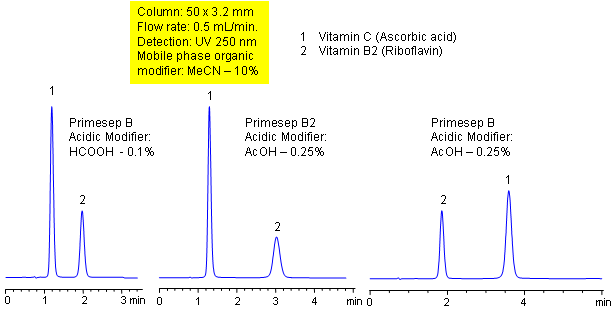
Primesep B and B2 columns separate Vitamins C (ascorbic acid) and B2 (riboflavin) with tunable selectivity. Peak order reversal is exhibited on these two columns with the same mobile phases due to their different polarity. The HPLC separation uses a mobile phase of water, acetonitrile (MeCN, ACN) and either formic or acetic acid (HOAc) with UV detection at 250 nm.
| Column | Primesep B, Primesep B2 , 3.2×50 mm, 5 µm, 100A |
| Mobile Phase | MeCN/H2O |
| Buffer | Formic Acid, Acetic Acid |
| Flow Rate | 0.5 ml/min |
| Detection | UV, 250 nm |
| Class of Compounds |
Drug, Vitamin B₆, Hydrophobic, Ionizable |
| Analyzing Compounds | Vitamins C (ascorbic acid) and B2 (riboflavin) |
Application Column
Primesep B
The Primesep family of mixed-mode columns offers a wide variety of stationary phases, boasting unprecedented selectivity in the separation of a broad array of chemical compounds across multiple applications. Corresponding Primesep guard columns, available with all stationary phases, do not require holders. SIELC provides a method development service available to all customers. Inquire about our specially-tailored custom LC-phases for specific separations.
Select optionsPrimesep B2
The Primesep family of mixed-mode columns offers a wide variety of stationary phases, boasting unprecedented selectivity in the separation of a broad array of chemical compounds across multiple applications. Corresponding Primesep guard columns, available with all stationary phases, do not require holders. SIELC provides a method development service available to all customers. Inquire about our specially-tailored custom LC-phases for specific separations.
Select optionsAscorbic Acid
Vitamin B2 (Riboflavin)
Vitamin C

HPLC Separation of Vitamin B
April 3, 2004
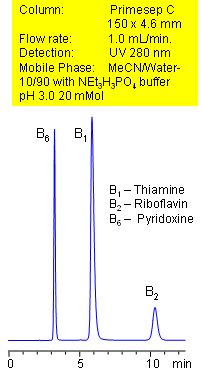
Primesep C separates B vitamins with baseline resolution by a combination of cation exchange, complex formation, and hydrophobic interactions. Vitamin B1 (thiamine), vitamin B2 (riboflavin), and vitamin B6 (pyridoxine) are separated with a mobile phase of water, acetonitrile (MeCN, ACN) and triethylamine (TEA) phosphate with UV detection at 280 nm.
| Column | Primesep C , 4.6×150 mm, 5 µm, 100A |
| Mobile Phase | MeCN/H2O -10/90% |
| Buffer | NEt3H3PO4 Ph 3.0 – 20 Mm |
| Flow Rate | 1.0 ml/min |
| Detection | UV, 280 nm |
| Class of Compounds |
Drug, Vitamin B₆, Hydrophobic, Ionizable |
| Analyzing Compounds | Pyridoxine, Thiamine, Riboflavin |
Application Column
Primesep C
The Primesep family of mixed-mode columns offers a wide variety of stationary phases, boasting unprecedented selectivity in the separation of a broad array of chemical compounds across multiple applications. Corresponding Primesep guard columns, available with all stationary phases, do not require holders. SIELC provides a method development service available to all customers. Inquire about our specially-tailored custom LC-phases for specific separations.
Select optionsVitamin B1 (Thiamine)
Vitamin B2 (Riboflavin)
Vitamin B6 (Pyridoxine)
Vitamins

